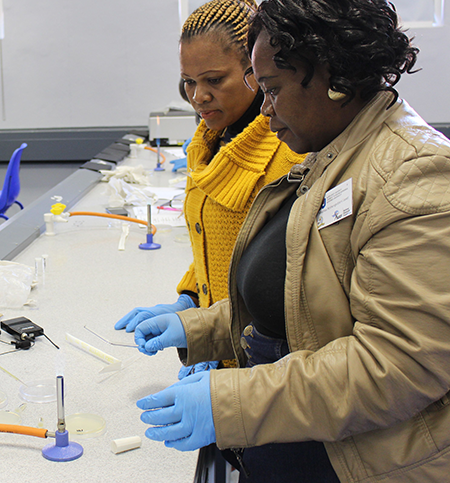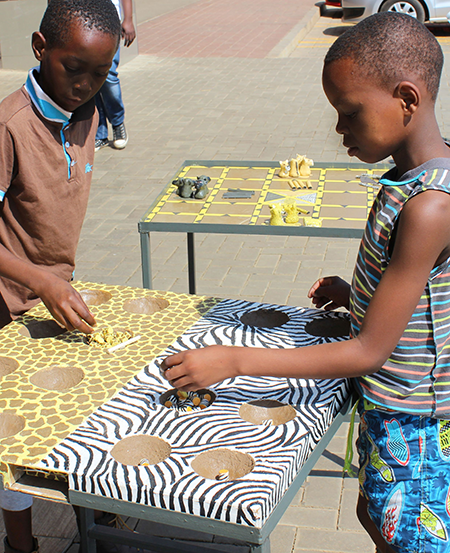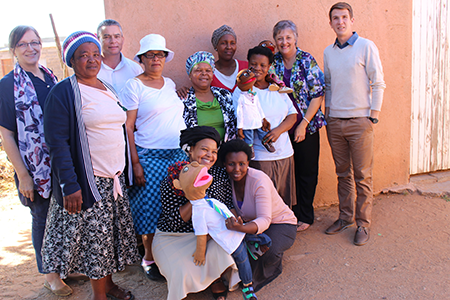The 21st century is a challenging time and it is important that both teachers and school learners become self-directed learners. The North-West University's (NWU's) research focus area for Self-directed Learning (SDL), under the directorship of Prof Elsa Mentz, focuses especially on indigenous knowledge for self-directed learning in the science and mathematics classroom.
Self-directed learners are people who can identify their own learning needs, and who can plan strategies and identify resources that would help them to achieve those learning goals, says Prof Josef de Beer, research professor at the School for Natural Sciences and Technology for Education. “They should also be able to assess whether they have reached these goals.”
Self-directed learning is important in a climate of rapid change and great uncertainty. “Schools have to prepare learners for possible new careers that does not exist yet,” Josef says. “This will require young people to do their own research, and to prepare and capacitate themselves for such careers by acquiring the necessary knowledge and skills.”
The big question, he says, is whether this process can happen in a schooling system where transmission-mode teaching dominates and which is driven by preparing learners for examinations.
“It is therefore very important for higher education institutions to look at how teacher professional development initiatives could enhance teachers’ self-directedness, and develop their pedagogical content knowledge to meet the demands of preparing learners for a modern society that is characterised by continuous change.”
Research that is relevant in an era of decolonisation
The research focus area has eight subprogrammes. One of these focuses on indigenous knowledge for self-directed learning. This subprogramme supports research on teacher professional development where indigenous knowledge is incorporated into the teaching of natural sciences and mathematics.
This is of the utmost relevance in an era of the “decolonisation of the curriculum,” Josef says. The basic assumption is that indigenous knowledge could contribute to better contextualisation of science or mathematics curriculum themes, so that learners experience the curriculum content as relevant to their own lives.
“The researchers also look at the development of teacher agency, meaning that teachers need to be encouraged to improvise to overcome barriers in their teaching. An example is developing science-on-a-shoestring approaches towards teaching in underresourced schools. This requires the teacher to be a self-directed learner, who will engage in critical thinking and creatively explore cost-effective solutions to systemic barriers in teaching and learning.”
He says the project has the support of the National Research Foundation (NRF), which funds three-day short courses for teachers. During these courses, teachers learn how to infuse indigenous knowledge into their teaching of CAPS topics, using the processes of science. Josef, the principal investigator, obtained funding from the Competitive Programme for Rated Researchers, as well as the Indigenous Knowledge Systems NRF programmes.

Life Sciences teachers do laboratory work during the short course.
Here they are engaged in the Kirby-Bauer technique to test anti-microbial properties of muthi plants.
Overcoming a lack of resources
Josef said the problem is that transfer to the classroom does not automatically follow these interventions. One of the reasons for this is that many teachers teach in underresourced classrooms.
The Fuchs Foundation chose this project as one of 12 national flagship programmes, and the foundation's funding of R2,25 million is used to provide mathematics and science teachers with apparatus and equipment for their classrooms. Among others, the NWU researchers work with Prof Manu Prakash from Stanford University in America to develop these kits, which would include his “Foldscope” microscopes. Although these paper microscopes cost about US$ 1 (R13) per microscope, they allow for a magnification of up to 2 000 times.
Josef says in rural communities that are often plagued by polluted water resources that could cause disease, these small microscopes provide wonderful opportunities to science teachers to make science locally relevant and engage learners in authentic problems in their communities. In the project, both problem-based learning and cooperative learning approaches are emphasised, and teachers are sensitised towards the use of such approaches in the science, technology, engineering and mathematics (STEM) classroom.
Puppetry and play
“Mathematics teachers have the opportunity to engage with African indigenous games, such as morabaraba, during the three-day short courses,” he says. “They are then asked to explore ways of integrating such games in their teaching of mathematics themes. A game such as morabaraba can be an effective way to explain 2D concepts in geometry, and could also be instrumental in the conceptual development of learners.”

Two boys play morabaraba.
Although the focus is predominantly on Senior Phase (grades 7 – 9) and FET (grades 10 – 12) teachers, the project also targets Foundation Phase and Intermediate Phase teachers, for example through the use of puppetry in the classroom.
Puppetry can be a very effective pedagogy to teach learners about the nature of science, and the nature of indigenous knowledge. The Department of Science and Technology is nowadays promoting STEAM education (science, technology, engineering, arts and mathematics), and no longer the more narrow STEM grouping only.
This project emphasises that learners should enter the science or mathematics classroom as homo ludens - the playing human. Teachers are shown how a pedagogy of play could support conceptual development of learners. The puppets (sponsored by the Fuchs Foundation), are produced by a marginalised community in Jan Kempdorp, and the project therefore also has a strong community engagement focus as it puts food on peoples’ tables.
The Indigenous Knowledge for Self-directed Learning project provides a community of practice platform to researchers from the NWU, the University of Limpopo, the University of Johannesburg and the University of the Free State, as well as Georgia State University and Stanford University in America.
“We have also partnered with the holders of indigenous knowledge at the Mphebatho Museum in Moruleng,” says Josef.
Several master’s and PhD students are pursuing postgraduate studies through this project. To date, short courses have been offered to mathematics, life sciences and technology teachers in Limpopo, the North-West Province and the Northern Cape.

People in the Jan Kempdorp community, producing the puppets, with NWU researchers.
